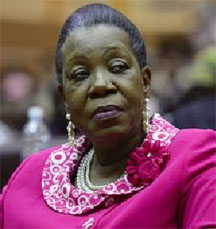BANGUI, (Reuters) – At least eight people were killed in mob violence in Central African Republic’s capital, Bangui, yesterday as senior officers from the Seleka rebel movement fled the city, according to the country’s Red Cross and a rights group.

Almost 1 million people, or a quarter of the population, have been displaced by fighting that began when the mainly Muslim Seleka rebels seized power in the majority Christian former French colony in March.
Christian self-defence groups, known as “anti-balaka”, or anti-machete, have since taken up arms against them.
U.S. Secretary of State John Kerry warned yesterday that Washington was prepared to impose targeted sanctions against those responsible for the religious-based violence .
The United Nations estimates that more than 2,000 people have been killed since March in tit-for-tat bloodshed that a French intervention force and thousands of African peacekeepers have failed to stop.
“Today there were eight dead. Only one was shot. The rest were killed with primitive weapons. We even had one woman whose throat was slit,” Antoine Mbao Bogo, president of the country’s Red Cross, told Reuters.
Seven others were injured in Sunday’s violence, he said.
Kerry said the United States was deeply concerned with the escalation in clashes.
“The United States is prepared to consider targeted sanctions against those who further destabilize the situation, or pursue their own selfish ends by abetting or encouraging the violence,” Kerry said in a statement.
“Preventing the violence from gaining further momentum and costing more lives will require all of CAR’s leaders, past and present, to be clear in condemning it,” he said.
It was not immediately clear why the rebel leaders, who were travelling in a convoy of more than two dozen vehicles, left Bangui or where they were heading.
Central African Republic swore in new interim President Catherine Samba-Panza on Thursday, replacing Michel Djotodia, a former Seleka leader, who stepped down on Jan. 10 under intense international pressure.
A heavily armed Seleka convoy left Bangui on Sunday, escorted by Chadian soldiers from the country’s African Union peacekeeping force, a human rights campaigner told Reuters.
“In the middle of the convoy, I saw several Seleka generals, including the head of military intelligence,” said Peter Bouckaert, emergencies director for Human Rights Watch, who saw the convoy 60 km (37 miles) north of the city. “It feels a bit like the endgame for Seleka in Bangui.”
Many Seleka fighters, a large number of whom came from neighbouring Chad and Sudan, have abandoned the capital in recent months following the deployment of French troops.
